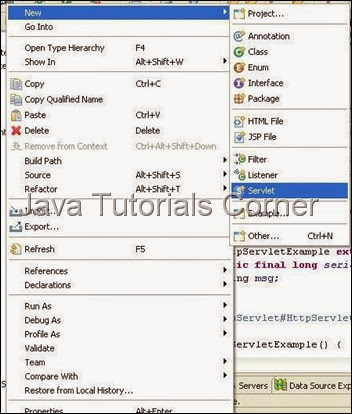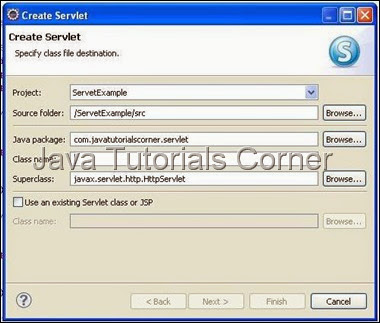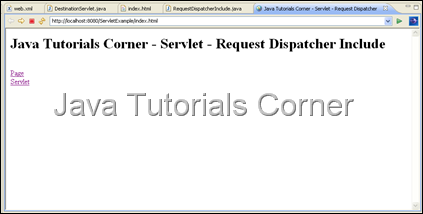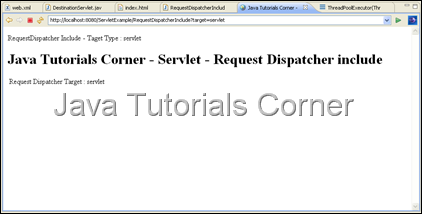In this tutorial we are going to see about Servlet Request Dispatcher include with example program.
Includes the content of a resource (servlet, JSP page, HTML file) in the response. In essence, this method enables programmatic server-side includes.
The ServletResponse object has its path elements and parameters remain unchanged from the caller's. The included servlet cannot change the response status code or set headers; any attempt to make a change is ignored.
The request and response parameters must be either the same objects as were passed to the calling servlet's service method or be subclasses of the ServletRequestWrapper or ServletResponseWrapper classes that wrap them.
This method sets the dispatcher type of the given request to DispatcherType.INCLUDE.
request - a ServletRequest object that contains the client's request
response - a ServletResponse object that contains the servlet's response
The getRequestDispatcher(String) method of request object returns RequestDispatcher Interface.
Now see the example program
1. Create new Dynamic web project by choosing File –> New –> Dynamic Web Project .
2. Create the Project called ServletExample as given below.

3. Create package called com.javatutorialscorner.servlet under ServletExample.
4. Create following Servlet as shown in figure.


5. Click Next it will show URL mapping.You can edit Servlet URL if you need.
6. Click Next it will show methods available in HttpServlet. Select appropriate method you need.

7. By default your servlet will be mapped in web.xml, if your servlet not mapped in your web.xml use the following configuration to map the servlet in your web.xml
Servlet Mapping
web.xml
8. Add the required code inside doGet() method.
RequestDispatcherInclude.java
DestinationServlet.java
9. Create html page in WebContent folder
index.html
In above html page in form tag method="get"to mention the form submit using get method.The default method to submit form is GET.
10. Now save and Run the servlet, Run As –> Run on Server – Select your web Server to run the servlet. ( see How to configure tomcat in eclipse)
http://www.javatutorialcorner.com/2014/03/how-to-configure-tomcat-in-eclipse.html
11.call the following URL .
http://localhost:8080/ServletExample/index.html
Output

Click The Link page
See the response of servlet Included in page.

Click The Link Servlet
See the response of first servlet Included in Response of second Servlet.

void include(ServletRequest request,ServletResponse response)throws ServletException,java.io.IOException
Includes the content of a resource (servlet, JSP page, HTML file) in the response. In essence, this method enables programmatic server-side includes.
The ServletResponse object has its path elements and parameters remain unchanged from the caller's. The included servlet cannot change the response status code or set headers; any attempt to make a change is ignored.
The request and response parameters must be either the same objects as were passed to the calling servlet's service method or be subclasses of the ServletRequestWrapper or ServletResponseWrapper classes that wrap them.
This method sets the dispatcher type of the given request to DispatcherType.INCLUDE.
RequestDispatcher requestDispatcher = request.getRequestDispatcher("/index.html");
requestDispatcher.include(request, response);
request - a ServletRequest object that contains the client's request
response - a ServletResponse object that contains the servlet's response
RequestDispatcher getRequestDispatcher(String);
The getRequestDispatcher(String) method of request object returns RequestDispatcher Interface.
Now see the example program
1. Create new Dynamic web project by choosing File –> New –> Dynamic Web Project .
2. Create the Project called ServletExample as given below.

3. Create package called com.javatutorialscorner.servlet under ServletExample.
4. Create following Servlet as shown in figure.
- RequestDispatcherInclude
- DestinationServlet


5. Click Next it will show URL mapping.You can edit Servlet URL if you need.
6. Click Next it will show methods available in HttpServlet. Select appropriate method you need.

7. By default your servlet will be mapped in web.xml, if your servlet not mapped in your web.xml use the following configuration to map the servlet in your web.xml
Servlet Mapping
<servlet>
<servlet-name>Your Servlet Name</servlet-name>
<servlet-class>Fully Qulaified Servlet Class Name</servlet-class>
</servlet>
<servlet-mapping>
<servlet-name>Your Servlet Name</servlet-name>
<url-pattern>/URL to Call Servlet</url-pattern>
</servlet-mapping>
web.xml
<?xml version="1.0" encoding="UTF-8"?> <web-app xmlns:xsi="http://www.w3.org/2001/XMLSchema-instance" xmlns="http://java.sun.com/xml/ns/javaee" xmlns:web="http://java.sun.com/xml/ns/javaee/web-app_2_5.xsd" xsi:schemaLocation="http://java.sun.com/xml/ns/javaee http://java.sun.com/xml/ns/javaee/web-app_3_0.xsd" id="WebApp_ID" version="3.0"> <display-name>ServetExample</display-name> <welcome-file-list> <welcome-file>index.html</welcome-file> <welcome-file>index.htm</welcome-file> <welcome-file>index.jsp</welcome-file> <welcome-file>default.html</welcome-file> <welcome-file>default.htm</welcome-file> <welcome-file>default.jsp</welcome-file> </welcome-file-list> <servlet> <servlet-name>RequestDispatcherInclude</servlet-name> <servlet-class>com.javatutorialscorner.servlet.RequestDispatcherInclude</servlet-class> </servlet> <servlet-mapping> <servlet-name>RequestDispatcherInclude</servlet-name> <url-pattern>/RequestDispatcherInclude</url-pattern> </servlet-mapping> <servlet> <servlet-name>DestinationServlet</servlet-name> <servlet-class>com.javatutorialscorner.servlet.DestinationServlet</servlet-class> </servlet> <servlet-mapping> <servlet-name>DestinationServlet</servlet-name> <url-pattern>/DestinationServlet</url-pattern> </servlet-mapping> </web-app>
8. Add the required code inside doGet() method.
RequestDispatcherInclude.java
package com.javatutorialscorner.servlet;
import java.io.IOException;
import java.io.PrintWriter;
import javax.servlet.RequestDispatcher;
import javax.servlet.ServletException;
import javax.servlet.http.HttpServlet;
import javax.servlet.http.HttpServletRequest;
import javax.servlet.http.HttpServletResponse;
/**
* Servlet implementation class RequestDispatcherInclude
*/
public class RequestDispatcherInclude extends HttpServlet {
private static final long serialVersionUID = 1L;
/**
* @see HttpServlet#HttpServlet()
*/
public RequestDispatcherInclude() {
super();
// TODO Auto-generated constructor stub
}
/**
* @see HttpServlet#doGet(HttpServletRequest request, HttpServletResponse
* response)
*/
protected void doGet(HttpServletRequest request,
HttpServletResponse response) throws ServletException, IOException {
// TODO Auto-generated method stub
String target = request.getParameter("target");
RequestDispatcher requestDispatcher = null;
response.setContentType("text/html");
PrintWriter writer = response.getWriter();
if (target.equals("page")) {
writer.print("Taget Type : " + target);
requestDispatcher = request.getRequestDispatcher("/index.html");
} else {
writer.print("RequestDispatcher Include - Taget Type : " + target);
requestDispatcher = request
.getRequestDispatcher("DestinationServlet");
}
requestDispatcher.include(request, response);
}
/**
* @see HttpServlet#doPost(HttpServletRequest request, HttpServletResponse
* response)
*/
protected void doPost(HttpServletRequest request,
HttpServletResponse response) throws ServletException, IOException {
// TODO Auto-generated method stub
}
}
DestinationServlet.java
package com.javatutorialscorner.servlet;
import java.io.IOException;
import java.io.PrintWriter;
import javax.servlet.ServletException;
import javax.servlet.http.HttpServlet;
import javax.servlet.http.HttpServletRequest;
import javax.servlet.http.HttpServletResponse;
/**
* Servlet implementation class DestinationServlet
*/
public class DestinationServlet extends HttpServlet {
private static final long serialVersionUID = 1L;
/**
* @see HttpServlet#HttpServlet()
*/
public DestinationServlet() {
super();
// TODO Auto-generated constructor stub
}
/**
* @see HttpServlet#doGet(HttpServletRequest request, HttpServletResponse
* response)
*/
protected void doGet(HttpServletRequest request,
HttpServletResponse response) throws ServletException, IOException {
// TODO Auto-generated method stub
String target = request.getParameter("target");
response.setContentType("text/html");
PrintWriter writer = response.getWriter();
writer.write("<!DOCTYPE html PUBLIC \"-//W3C//DTD HTML 4.01 Transitional//EN\" \"http://www.w3.org/TR/html4/loose.dtd\">\n"
+ "<html><head><meta http-equiv=\"Content-Type\" content=\"text/html; charset=ISO-8859-1\"><title>Java Tutorials Corner - Servlet - Request Dispatcher include</title>"
+ "</head><body><h1>Java Tutorials Corner - Servlet - Request Dispatcher include</h1><table><tr>"
+ "<td> Request Dispatcher Target : </td><td>"
+ target
+ "</td></tr></table></body></html>");
}
/**
* @see HttpServlet#doPost(HttpServletRequest request, HttpServletResponse
* response)
*/
protected void doPost(HttpServletRequest request,
HttpServletResponse response) throws ServletException, IOException {
// TODO Auto-generated method stub
}
}
9. Create html page in WebContent folder
index.html
<!DOCTYPE html PUBLIC "-//W3C//DTD HTML 4.01 Transitional//EN" "http://www.w3.org/TR/html4/loose.dtd"> <html> <head> <meta http-equiv="Content-Type" content="text/html; charset=ISO-8859-1"> <title>Java Tutorials Corner - Servlet - Request Dispatcher Include</title> </head> <body> <h1>Java Tutorials Corner - Servlet - Request Dispatcher Include</h1> <br /> <a href="http://localhost:8080/ServletExample/RequestDispatcherInclude?target=page">Page</a> <br /> <a href="http://localhost:8080/ServletExample/RequestDispatcherInclude?target=servlet">Servlet</a> </body> </html>
In above html page in form tag method="get"to mention the form submit using get method.The default method to submit form is GET.
10. Now save and Run the servlet, Run As –> Run on Server – Select your web Server to run the servlet. ( see How to configure tomcat in eclipse)
http://www.javatutorialcorner.com/2014/03/how-to-configure-tomcat-in-eclipse.html
11.call the following URL .
http://localhost:8080/ServletExample/index.html
Output

Click The Link page
See the response of servlet Included in page.

Click The Link Servlet
See the response of first servlet Included in Response of second Servlet.






0 comments:
Post a Comment